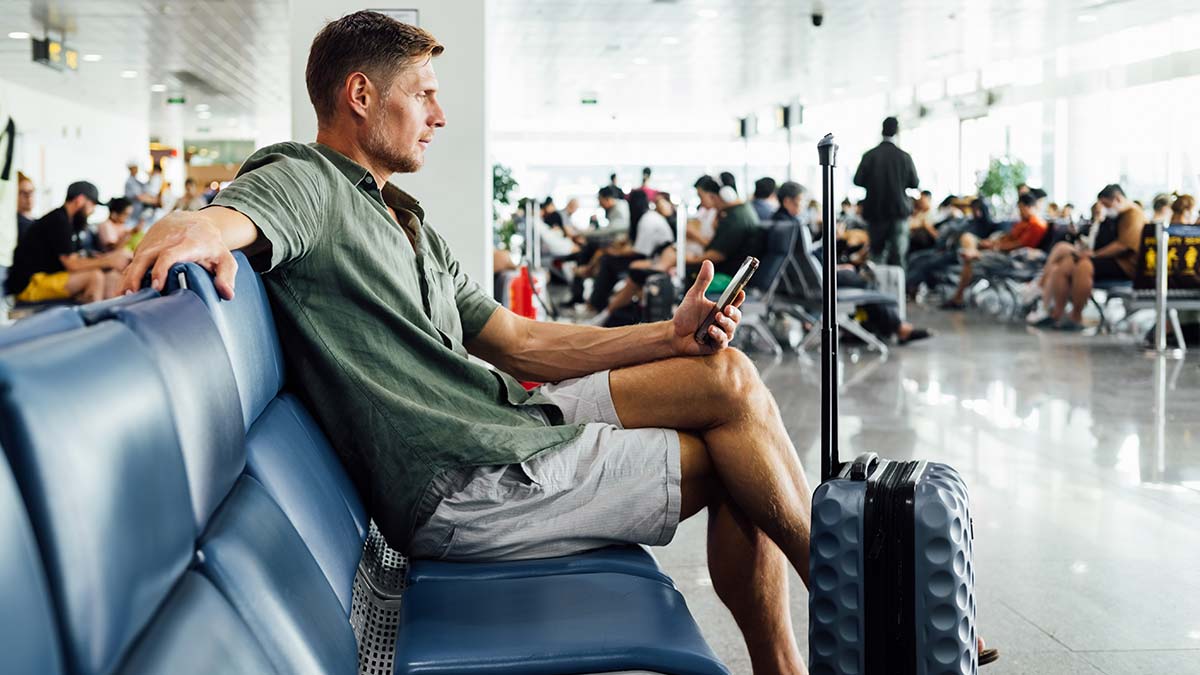An overseas road trip is a great way to explore new countries, but you may find different road rules, driving conditions and licence requirements such as International Driving Permits make it a challenge. Here’s what you need to know to stay safe.
Countries with reciprocal healthcare agreements when travelling overseas

When planning an overseas trip, Australian travellers need to understand their healthcare options in other countries to avoid unexpected medical expenses and ensure a safer, more enjoyable journey.
Many Australians mistakenly believe that reciprocal health agreements will cover all their medical needs while travelling overseas. But these agreements exist in a limited number of countries and primarily cover essential services.
Therefore, it's important for Australian travellers to understand the limitations of reciprocal health agreements and decide if they have appropriate travel insurance coverage, particularly for pre-existing medical conditions.
Essential travel safety guides
What are reciprocal health agreements?
Australia has Reciprocal Health Care Agreements (RHCAs) with several countries, allowing Australian residents access to limited, essential medical treatment if they fall ill or have an accident while visiting.
The agreements aim to provide visitors with medically necessary care that can't reasonably wait until they return home. In practice, this means if you become sick or injured while visiting one of these countries, you may receive treatment through the local public health system.
RACV Head of Travel Insurance Judith Gamble says many Australians mistakenly believe reciprocal health agreements will cover all their medical needs while traveling overseas.
"Reciprocal health agreements typically only cover essential medical treatment in public facilities, often with waiting periods," Gamble says. "What's particularly concerning is that many travellers with pre-existing medical conditions may not realise these conditions are usually excluded from reciprocal coverage altogether."
Which countries does Australia have reciprocal health agreements with?
As of mid-2025, Australia has agreements with the following countries:
- Belgium
- Finland
- Italy
- Malta
- Netherlands
- New Zealand
- Norway
- the Republic of Ireland
- Slovenia
- Sweden
- United Kingdom
What do RHCAs cover?
While reciprocal health care agreements can offer a useful safety net, they're far from a replacement for travel insurance. Coverage varies between countries, and in most cases, only treatment deemed immediately necessary is covered.
Some of RHCA limitations can include:
- No (or limited) cover for ambulance services - in many RHCA countries, ambulance transport is not automatically covered and can result in large bills.
- No cover for private hospital treatment - treatment limited to public hospitals, which may have long wait times. If you choose (or need) to be treated privately, you'll usually have to pay the full cost.
- Limited medicine cover - some agreement countries don't cover the cost of medicine when you travel to them. Others will partly cover the cost of prescribed medicines. Subsidised medicines may not be available, or only at the same rate as local resident - which could still be expensive.
- No cover for ongoing treatment - if you develop a condition that requires follow-up care, you may not be eligible for subsidised treatment beyond the immediate emergency.
- No cover for medical evacuation or repatriation - if you need to be medically evacuated back to Australia or to another country, the cost can be exorbitent.
- Typically no cover for dental care - if you need dental work done when travelling overseas, RHCAs will generally exclude dental care.
Simply put, an RHCA is intended to stop travellers from being turned away from emergency treatment. But it won't protect you from the significant costs of unexpected incidents, especially if you require non-urgent care, private treatment, or evacuation.

Reciprocal health care agreements don't fully cover medical costs, which travel insurance can help with. Image: Shutterstock
Why you should disclose pre-existing medical conditions
When planning a trip, many people hesitate to disclose pre-existing medical conditions when purchasing travel insurance. They might worry it will increase the premium, or assume that it won't matter. However, disclosing your medical history is not only responsible - it can make a huge difference if you need help overseas.
What counts as a pre-existing medical condition?
Each insurer may define pre-existing conditions differently. It's important to read your individual policy and product disclosure statements to understand how existing medical conditions and chronic illnesses are defined.
In general, any condition for which you've received medical advice, treatment or medication in a set period (often 12-24 months before you travel) may be considered pre-existing. Your insurer may automatically cover some pre-existing medical conditions, given that you meet certain criteria. Other pre-existing medical conditions may need to be assessed by the insurer.
Why disclose pre-existing medical conditions?
If you don't disclose pre-existing conditions and later require medical treatment related to that condition overseas, your insurer may decline your claim. This could leave you facing medical bills that run into thousands or even hundreds of thousands of dollars.
"Even minor pre-existing conditions can become serious health events when travelling. Something as common as asthma or high blood pressure could lead to complications that aren't covered under reciprocal arrangements," Gamble explains.
"Full disclosure of pre-existing medical conditions is crucial when purchasing travel insurance. Many travellers don't realise that conditions they consider 'under control' still need to be disclosed, including managed high blood pressure, controlled diabetes, or past surgeries."
For example, if you have asthma but don't tell your insurer and later suffer an asthma attack abroad, the cost of hospitalisation, medication and even medical evacuation would likely not be covered.
By fully disclosing your health history, you give your insurer the opportunity to assess the risk and offer coverage that suits your situation. You might pay a higher premium or an additional excess, but you gain the certainty that you’ll be protected if something related to that condition arises.

It's important to disclose pre-existing medical conditions before you travel. Image: Getty
How travel insurance complements reciprocal health care agreements
Even if you're travelling to a country with an RHCA, travel insurance remains an essential part of trip planning.
Medical costs beyond the basics
RHCAs generally cover only emergency treatment in public hospitals. They do not cover private hospitals, dental care or specialist services that aren't considered urgent. Travel insurance can help cover these gaps.
Medical evacuation and repatriation
RHCAs don't cover the cost of bringing you back to Australia if you become seriously ill or injured. Medical evacuations can involve specialised air ambulances, medical staff and complex logistics. The resulting bills can be staggering.
Non-medical travel disruptions
Travel insurance is about far more than medical costs. It can help protect you financially if:
- your luggage is lost, stolen, or damaged
- your trip is cancelled or delayed due to illness, natural disaster, or unforeseen events
- you suffer a personal liability claim overseas
- you need to return home early for family emergencies
Cover for your companions
If you travel with family or friends, travel insurance could also help cover expenses for them to stay with you or accompany you home if you're hospitalised.
Travelling beyond RHCA countries
If your journey includes countries not covered by reciprocal agreements (such as the United States, Canada, most Asian countries, or South America), the need for comprehensive travel insurance becomes even more pressing. Medical care in these destinations can be expensive. Without any government-backed safety net, you'll be fully responsible for costs if uninsured.

Medical care can be very expensive without travel insurance. Image: Getty
Practical healthcare tips for travellers
Check which countries have RHCAs before you go
The list can change, so visit Services Australia or the Department of Foreign Affairs and Trade (DFAT) website for the most up-to-date information.
Apply for necessary documentation to access healthcare. In most countries, you'll need to show your Australian passport (or another valid passport showing that you're a permanent Australian resident) and your current Medicare card.
Some countries may also require you to fill out additional forms - like the Netherlands, which requires you to complete and post a certificate of eligibility.
Consider obtaining travel insurance at the time of booking your trip
Review travel insurance policy documents carefully to understand coverage limits. Look at what's covered, its exclusions, and whether pre-existing conditions are included. When travelling, carry your travel insurance details and emergency contact details with you at all times.
Monitor the Australian government website Smarttraveller to keep abreast of any travel warnings. Many travel insurance policies don't cover travel to a country listed as Do Not Travel.
Always disclose pre-existing medical conditions
Complete the insurer's health questionnaire honestly when purchasing travel insurance, and disclose any pre-existing medical conditions you have.
RACV Travel Insurance offers coverage options for travellers with pre-existing conditions subject to medical assessment for conditions, including cardiovascular issues, respiratory conditions, diabetes and pregnancy. Some conditions may be automatically covered without additional premium, while others require assessment and potential premium adjustment.
"Don't let an uninsured medical condition ruin your long-awaited trip," Gamble advises. "Taking the time to disclose your conditions and arrange appropriate coverage provides greater peace of mind."
The information provided is general advice only. Before making any decisions please consider your own circumstances and the Product Disclosure Statement and Target Market Determinations. For copies, visit racv.com.au. Royal Automobile Club of Victoria (RACV) Ltd AR 001243563 is an authorised representative of the issuer and receives commission for each policy sold or renewed. RACV Travel Insurance issued by Tokio Marine & Nichido Fire Insurance Co., Ltd ABN 80 000 438 291 AFSL 246 548. Terms & conditions apply, refer to the PDS.


